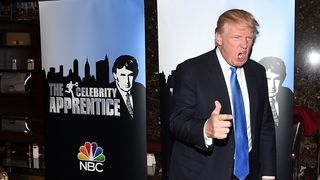Four months in, it's fair to say the Trump administration is in trouble. A special counsel has been appointed to look into potential criminal wrongdoing by the President and members of his team. Congressional hearings are ramping up, with fired FBI director James Comey slated to offer public testimony later this week. Americans have heard more about Watergate in the past two weeks than any time since Richard Nixon resigned.
Talk of impeachment, while rampant, is premature. But we can start to draw some conclusions about Trump's shortcomings as commander-in-chief. He ran on his business and leadership credentials, promising to run the country like he ran his real estate empire. It turns out that Trump's leadership skills are better suited to reality television than the White House. In fact, the failures of Trump's first few months suggest the very notion that the government should be run by a CEO should be retired.
Before his presidential run, Trump's claim to fame was his ability to hire and fire people. His hit television show The Apprentice was a jazzed-up job interview; his tagline "You're fired" a decisive dismissal. So it's ironic that the future of his presidency may hang on his decision to hire one man and fire another.
When Trump teamed with Michael Flynn, a retired general who had been pushed out of the Obama administration, the partnership raised eyebrows. After all, Flynn had a penchant for the conspiratorial, tweeting that Hillary Clinton was involved in a paedophile ring and arguing that Democrats were trying to institute sharia law in America. But it was the decision to make Flynn the national security advisor that raised serious concerns about Trump's ability to hire the right people.
Recent revelations show the choice of Flynn was even more alarming than it initially seemed. At the time Flynn was appointed, Trump and others in the administration knew he was a foreign agent working for Turkey and that he was under federal investigation. Trump appointed him anyway. It's hard to imagine a more willfully negligent hiring decision.
But if hiring Flynn was a dereliction of duty, firing James Comey was an abuse of power. FBI directors are appointed to 10-year terms as a way of insulating them from electoral politics. The president has a right to fire the director – Bill Clinton fired an FBI director caught up in a series of financial and ethical scandals – but the reason for the firing matters. A lot.
The administration has cycled through a number of possible excuses for Comey's firing, but it was Trump who twice explained why he did it: Comey's persistence in investigating Russian interference in the 2016 election. And firing the FBI director in order to stop an investigation cuts remarkably close to obstruction of justice.
No one has seemed particularly surprised that Trump would try to obstruct the FBI's investigation. But they do seem surprised that he so readily admitted it. Understanding Trump's CEO-like approach to politics helps clarify why he did. Trump defines leadership as calling the shots. The power to hire and fire, to ignore aides' advice, to be the decider – that's what it means to be the boss.
And in business, that's more or less true. Getting rid of a problem employee is one way of getting rid of a problem. Fire Flynn, fire Comey, and the Russia issue goes away.
In government, it doesn't work that way. The inspector can't be bought off. The case can't be settled out of court. You can't declare bankruptcy and cut your losses. Bad decisions have serious consequences.
Again and again during his time in office, Trump has run up against the limits of his art-of-the-deal approach to politics in a way that suggests a CEO makes a poor commander-in-chief. In addition to his other shortcomings, Trump doesn't know the politics business. He doesn't know the rules, doesn't know the people, doesn't know the institutions. Trying to build support for healthcare repeal, Trump managed to alienate his allies because he didn't understand the relationships or interests involved.
People succeed in business because they understand an industry. They master a subject, learn the difference between theory and practice, and then they roll the dice, taking risks that shatter expectations.
And while Trump's break-the-rules approach appeals to many of his supporters, the rules he's breaking come with heavy penalties. The investigations into Russia's interference in the election have, thus far, yielded no evidence of collusion with Trump.
Yet Trump has created a situation in which the cover-up is the crime. Every account of the unfolding crisis within the administration indicates that neither Trump nor his advisers understood that firing Comey could have political and legal consequences. That's the problem with outsiders running government. You need some insiders to tell you where the landmines are.
The broad frustration with political insiders and ossified establishments is understandable. But the Trump administration shows us what happens when specific expertise is replaced by general ignorance. It goes badly, both for the president and the people he's there to serve.






